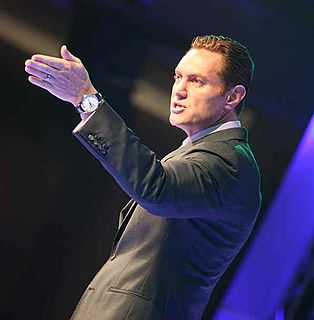A Quote by Napoleon Hill
Fear is a habit, so is self pity, defeat, anxiety, despair, hopelessness and resignation. You can eliminate all of these negative habits with two simple resolves: I can and I will.
Related Quotes
Habit is habit and not to be flung out of the window by any man, but coaxed downstairs a step at a time. You cannot eliminate habits that no longer serve you. You can only replace them with new habits that support your goals. Moment by moment, you need to live with awareness and structure the habits that you include or exclude in your days.
There are only two emotions: love and fear. All positive emotions come from love, all negative emotions from fear. From love flows happiness, contentment, peace, and joy. From fear comes anger, hate, anxiety and guilt. It's true that there are only two primary emotions, love and fear. But it's more accurate to say that there is only love or fear, for we cannot feel these two emotions together, at exactly the same time. They're opposites. If we're in fear, we are not in a place of love. When we're in a place of love, we cannot be in a place of fear.
How does one get rid of fear? Ramana: What is fear? It is only a thought. If there is anything besides the Self there is reason to fear. Who sees things separate from the Self? First the ego arises and sees objects as external. If the ego does not rise, the Self alone exists and there is nothing external. For anything external to oneself implies the existence of the seer within. Seeking it there will eliminate doubt and fear. Not only fear, all other thoughts centred round the ego will disappear along with it.
If a man considers that he is born, he cannot avoid the fear of death. Let him find out if he has been born or if the Self has any birth. He will discover that the Self always exists, that the body that is born resolves itself into thought and that the emergence of thought is the root of all mischief. Find from where thoughts emerge. Then you will be able to abide in the ever-present inmost Self and be free from the idea of birth or the fear of death.
Anxiety and desire are two, often conflicting, orientations to the unknown. Both are tilted toward the future. Desire implies a willingness, or a need, to engage this unknown, while anxiety suggests a fear of it. Desire takes one out of oneself, into the possibility or relationship, but it also takes one deeper into oneself. Anxiety turns one back on oneself, but only onto the self that is already known.
































